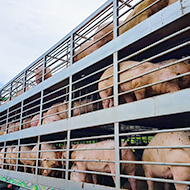Views sought on plans to ease OV shortage

Official veterinarians have an essential role to play in maintaining the delivery of official controls.
As the UK veterinary workforce crisis deepens, the Food Standards Agency (FSA) has written to abattoir workers inviting feedback on proposed changes to how FSA delivers controls through Official Veterinarians (OVs).
Figures released by the RCVS show that between 2019 and 2021, joiners to the UK veterinary profession fell by 26 per cent, while 2020 saw the highest number of vets leaving UK practice in 10 years. A Public Accounts Committee report released last week attributes this shortfall to many factors, including COVID-19, Brexit, a rise in pet ownership and increased demand for vets for Export Health Certification.
Official veterinarians have an essential role to play in maintaining the delivery of official controls. The FSA fears that without a consistent supply of OVs, abattoirs will be unable to operate - and there would be significant consequences for the UK's £9 billion meat industry.
FSA director of operations, Junior Johnson, commented: “Despite challenges in veterinary recruitment, the Food Standards Agency has maintained full and ongoing service delivery of official controls in abattoirs, and there has been no interruption in service to date.
“Official veterinarians are, however, in very short supply, and we are working with partners to find solutions to what is a systemic resourcing issue so that the FSA can continue to provide a reliable service to industry and uphold food safety, protect animal health and welfare, and enable businesses to sell food domestically and abroad.”
FSA sent a letter to abattoirs and cutting plants on Thursday (13 October) inviting feedback on how these changes may impact their business. The insight will help inform the association's decision-making and guide the subsequent steps.



 The Veterinary Medicines Directorate (VMD) is inviting applications from veterinary students to attend a one-week extramural studies (EMS) placement in July 2026.
The Veterinary Medicines Directorate (VMD) is inviting applications from veterinary students to attend a one-week extramural studies (EMS) placement in July 2026.